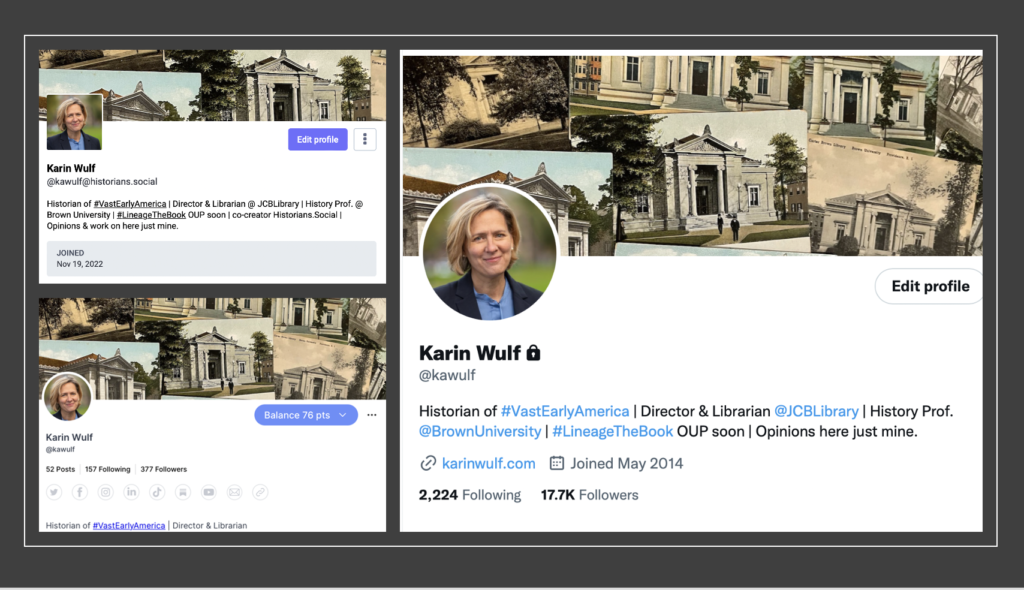I see lots of folks pondering what the major transitions at Twitter will mean for the communities of conversation they built up on that site. My own choices are sort of obvious here on my website in that on the homepage I have a feed for my Twitter account, where I had posted over many years a lot of long threads, especially about the complexity and urgent necessity of early American history (#VastEarlyAmerica). But that block on the homepage now says essentially “nothing to see here” because I locked my Twitter account (thus, no feed) and I’ve stopped posting there. What I miss most about the place, though, is not the space to muse –because I’ve been rebuilding that here and elsewhere –but the space to listen and learn.

On Twitter, I was able to listen in on conversations others were having about issues I came to know more about and which influenced my professional practices in particular. I think about the issues raised by early career scholars about the collapse of the academic job market, the ongoing tension around collaborative credit for scholarship, and other issues that are now part of much wider conversations but which I felt like I read in formation. (A new issue of the Journal of the Early Republic, for example, has an excellent forum about “The Material Conditions of Historians’ Labor.”).
I feel most keenly the absence of the histories, issues, and materials I learned about from Black and Native women historians especially (I think about, for just a very few examples, my now-colleague Keisha Blain, Jessica Marie Johnson, Martha Jones, Kadida Williams, Alyssa Mt. Pleasant and Jean O’Brien). The places and people and publications they pointed to in their tweets, the issues they raised and the resources they were generating were endlessly interesting –and important to me. I was always thinking about programs and communications around some of these issues I first learned about through the Twitter conversation. This was connected for me to the foundational importance of early American history, and the importance of that history reflecting its complexity, diversity, and regularly, systemically violent character. As I think about global and especially about multilingual contexts in my new role, I am wishing for those Twitter conversations even more.
I’m now spending most of my time on Mastodon, where my colleagues and friends Joe Adelman, Liz Covart and I started a new server (an “instance”) called historians.social. We’ve written terms of service and are moderating accordingly, but most importantly we’re sharing information weekly with all users about what it costs in money and time, and what the issues are we handle. It seems a healthy approach to social media generally (and as I and others have written on the Scholarly Kitchen for years –to publication and so much more) to understand the business model behind the platform you’re using. The community there is developing and it’s exciting to read new publications, new conferences, and reflections from all kinds of folks. It’s a real pleasure to be reading Mastodon almost like I read Twitter — for the learning! But it’s obviously a work in progress and it needs more diversity of the kind I experienced there. And I am also using Post, which is much more general still and feels pretty scattered. I had curated my Twitter feed carefully and am using Post for more journalists and others while dipping in and out of the general stream there. It’s still a very small space, but we shall see.
Perhaps my most selfishly rewarding social media experience right now is my modest Instagram account, VernacularGenealogy. It’s a little daily joy to remind a snippet of something and post it with context. And I’m so grateful for folks who are following and commenting! As I noted in another post, Vernacular Genealogy is the title of the second chapter of my forthcoming book (now close enough to being real that I’m starting to share more!). Over there I’m posting “research out-takes” from the voluminous materials I’ve collected in the course of my research on the nature and role of genealogy in 18th-century British America. You can see the feed right here on my homepage.
A final thing. Because I want to read from some of the people I have appreciated most over the years I am attending to a Feedly feed. There are other services for feeds, but I find that interface the most intuitive and simple, which is key right now in this age of social media mystery. So I subscribe to the RSS feed for places like Black Perspectives, the blog of the African American Intellectual History Society, and blog posts from other organizations and individuals like J.L. Bell’s Boston1775. (My blog now has an RSS feed so you can add me to yours!)
All of this social media profusion and confusion is both a problem and an obvious opportunity. I’m delighting in what I can share as on Instagram, but determined to work hardest on how I can learn more through locating folks intentionally and also finding folks serendipitously.
Joy of the season to you and yours!
